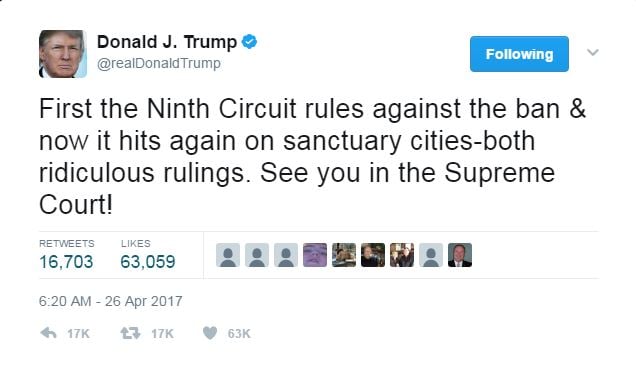
The famed hub of American 1960s radicalism and counterculture, Berkeley, California is at it again. Dormant for a few years, the US presidency of Donald Trump has awoken defiant spirits, as the city challenges administration policy over everything from immigration to taxation. One tool of resistance under consideration is an initial coin offering in creation of the city’s very own token.
Also read: Landmark Senate Crypto Hearing Seen as Mostly Positive by Bitcoiners
In Defiance of Trump Admin, Berkeley Considers Its Own Cryptocurrency
Berkeley city council member Ben Bartlett stressed, “Berkeley is the center of the resistance, and for the resistance to work, it must have a coin.” The resistance he spoke of has to do with the Trump administration, and its singling out of the local university over campus speech issues, along with threatening to defund Sanctuary Cities which decriminalize illegal immigrants, of which Berkeley is considered a leader.
The coin would be floated as a kind of municipal bond at first, targeted through an initial coin offering (ICO) aimed at funding housing for the city’s homeless. Mr. Bartlett continued, “You’re looking at a disaster. We thought we’d pull together the experts and find a way to finance [affordable housing] ourselves.”

Fear of immigration crackdowns, a reconstituted tax bill the city worries will impact it negatively, Mr. Bartlett has managed to get the city’s mayor on board the ICO idea. The city will partner with Neighborly and its UC Berkeley Blockchain Lab to push the project forward with a possible rollout by May. “Unlike most of the ICOs which deliver coins for a future value or service, these coins will represent a real security issued for a specific purpose,” Neighborly’s COO Kiran Jain explained.
A local token is seen, beyond housing concerns, as a hedge against Trump administration actions as a whole, Mr. Bartlett said. The city fully expects its budget to be impacted by federal cuts simply due to Berkeley’s role in openly fighting Mr. Trump’s policies on so many levels.

Match Made in Heaven
If ever two things were meant for one another, it’s cryptocurrency and Berkeley, California. Known for its radical political leanings since the 1960s, it is home to experiments in all kinds of living. For progressive communities like it, the federal government has been a political apparatus they wish to capture and put to use. In areas such as Civil Rights, for example, blanket, robust federal enforcement was seen as ideal to make sure citizens were protected from Pacific to Atlantic.
Other political philosophies warned how empowering the federal or national government to overwhelm local communities for the greater good, even in the service of racial equality, was a dangerous bargain. What would be to stop it from doing the same in the opposite direction should it begin to enforce a national or federal policy those in Berkeley didn’t admire?

The United States prior to early 1960s federal legislation in this regard practiced something known as states rights: the ability for states to effectively nullify federal overreach. States rights and nullification during the 1960s were considered code to protect racists who desired to keep ethnic minorities as second-class citizens. And the federal government was employed several times to enforce social engineering schemes from desegregation of public schools through busing to making sure business commercial arrangements were also race neutral.
The national government could wield this power through the purse. Oh, your state or locality doesn’t want to obey our latest mandate? Great. No federal funding for education, for roads, for this or that, and some of these subsidies were quite substantial. Communities were arm-twisted to accept federal standards not just on the Civil Rights front, but from environmental concerns to even automobile speed limits. And since nullification and states rights, enshrined in the country’s last amendment in the Bill of Rights, went out of vogue, locals became resigned to their fate.

Present day political realities unearthed nullification and states rights without calling it that. Stoners, potheads, heshers, and sexual minorities found those tools, and set about statewide referendums. Their successes are undeniable. Hardly anyone bats an eye at gay married couples anymore, and more states each election cycle are either decriminalizing recreational marijuana or legalizing it altogether. The City of Berkeley is another battle on the nullification front, and crypto could be its killer app.
The addition of tokenization could very well signal another way around more odious federal dictums, and at least one other major US state is said to be flirting with the idea.
What do you think of city governments tokenizing? Let us know in the comments section below.
Images courtesy of Pixabay, Twitter.
Need to calculate your bitcoin holdings? Check our tools section
The post The City of Berkeley, California Considers Doing Cryptocurrency ICO appeared first on Bitcoin News.
originally published on http://ift.tt/2ETvMJ2